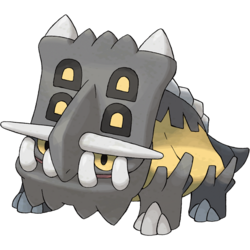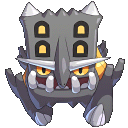From Bulbapedia, the community-driven Pokémon encyclopedia.
|
|
| Line 349: |
Line 349: |
|
| |
|
| ====Name origin==== | | ====Name origin==== |
| Bastiodon is a combination of ''{{wp|bastion}}'' or ''{{wp|bastille}}'' and ''don'' (from δόντι ''dónti'', Greek for ''tooth''; a suffix in various dinosaur names). The spike through its nose is reminiscent of the {{wp|Body piercing#Nose piercing|nose bones}} from various indigenous tribes. | | Bastiodon is a combination of ''{{wp|bastion}}'' or ''{{wp|bastille}}'' and ''don'' (from δόντι ''dónti'', Greek for ''tooth''; a suffix in various dinosaur names). It may also be a pun on ''{{wp|mastodon}}''. The spike through its nose is reminiscent of the {{wp|Body piercing#Nose piercing|nose bones}} from various indigenous tribes. |
|
| |
|
| Torideps is a combination of 砦 ''toride'' (fortress) and ''{{wp|Triceratops}}''. | | Torideps is a combination of 砦 ''toride'' (fortress) and ''{{wp|Triceratops}}''. |
Revision as of 00:54, 22 September 2014
Bastiodon (Japanese: トリデプス Torideps) is a dual-type Rock/Steel Fossil Pokémon.
It evolves from Shieldon starting at level 30, after it is revived from an Armor Fossil.
Biology
Bastiodon appears to be a cross between a Zuniceratops and a bulldozer. Its dark gray, square head resembles a castle wall, complete with four cream yellow, window-like spots with a black outline, three dark gray spikes on the top, and two larger gray spikes in the upper corners. Bastiodon's triangular nose extends from the middle of its shield-like head down over its lips and appears to be pierced by a gray, horizontal spike. Four spikes jut downward and four large, blunt tusks protrude upward from its dark gray lower jaw. Bastiodon's cream yellow eyes are partially obscured by the nasal spike and spaced-out tusks. Its thick, cream yellow body is further protected by a gray ridge and dark gray plates on its back, jagged growths on its legs, and a plated tail. Despite its rough, intimidating appearance, Bastiodon is surprisingly docile, caring, and feeds on grass and Berries. If a herd of Bastiodon is attacked, the adults will line up in a wall around their young. Their rock-hard heads can repulse any attack.
In the anime
Major appearances
Bastiodon made its debut appearance in the anime in Ancient Family Matters! under the ownership of Byron. It also appeared in Dealing With Defensive Types! where it was used in the Gym battle against Ash.
Minor appearances
Pokédex entries
| Episode
|
Pokémon
|
Source
|
Entry
|
| DP107
|
Bastiodon
|
Dawn's Pokédex
|
Bastiodon, the Shield Pokémon and the evolved form of Shieldon. Its massively powerful shield-like face can deflect even the strongest of attacks.
|
|
In the manga
In the Phantom Thief Pokémon 7 manga
Bastiodon made a minor appearance in Phantom Thief Pokémon 7 under the ownership of Mako. The reporter used the large Shield Pokémon to block the titular thief's progress, but didn't actually battle him.
In the Pokémon Adventures manga
Diamond's Shieldon, nicknamed "Don," evolved into a Bastiodon fighting several opponents at the Galactic Veilstone Building. Already a sturdy Pokémon prior to evolving, this solidified its strong defenses even more.
In the Pokémon Diamond and Pearl Adventure!
Like in the games, Bastiodon appears alongside Byron. He used it during his training sessions with Hareta.
In the TCG
- Main article: Bastiodon (TCG)
Game data
Pokédex entries
| This Pokémon was unavailable prior to Generation IV.
|
|
|
|
|
|
|
| Generation IV
|
|
| Diamond
|
Any frontal attack is repulsed. It is a docile Pokémon that feeds on grass and berries.
|
| Pearl
|
When attacked, they form a wall with their shield like faces to protect their young.
|
| Platinum
|
When they lined up side by side, no foe could break through. They shielded their young in that way.
|
| HeartGold
|
When attacked, they form a wall. Their rock-hard faces serve to protect them from the attacks.
|
| SoulSilver
|
{{{soulsilverdex}}}
|
|
|
| Generation V
|
|
| Black
|
When they lined up side by side, no foe could break through. They shielded their young in that way.
|
| White
|
{{{whitedex}}}
|
| Black 2
|
When they lined up side by side, no foe could break through. They shielded their young in that way.
|
| White 2
|
{{{white2dex}}}
|
|
|
| Generation VI
|
|
| X
|
When they lined up side by side, no foe could break through. They shielded their young in that way.
|
| Y
|
Any frontal attack is repulsed. It is a docile Pokémon that feeds on grass and berries.
|
|
|
Game locations
| This Pokémon was unavailable prior to Generation IV.
|
|
|
|
|
|
|
In side games
Stats
Base stats
| Stat
|
Range
|
| At Lv. 50
|
At Lv. 100
|
60
|
|
120 - 167
|
230 - 324
|
52
|
|
51 - 114
|
98 - 223
|
168
|
|
155 - 242
|
306 - 478
|
47
|
|
46 - 108
|
89 - 212
|
138
|
|
128 - 209
|
252 - 412
|
30
|
|
31 - 90
|
58 - 174
|
Total: 495
|
Other Pokémon with this total
|
- Minimum stats are calculated with 0 EVs, IVs of 0, and (if applicable) a hindering nature.
- Maximum stats are calculated with 252 EVs, IVs of 31, and (if applicable) a helpful nature.
|
Pokéathlon stats
Type effectiveness
| Under normal battle conditions in Generation IX, this Pokémon is:
|
|
|
|
|
|
|
|
|
|
|
|
|
Learnset
|
|
|
|
- Bold indicates a move that gets STAB when used by Bastiodon
- Italic indicates a move that gets STAB only when used by an Evolution of Bastiodon
- Click on the generation numbers at the top to see level-up moves from other generations
|
|
|
|
|
- Bold indicates a move that gets STAB when used by Bastiodon
- Italic indicates a move that gets STAB only when used by an Evolution of Bastiodon
- Click on the generation numbers at the top to see TM moves from other generations
|
|
|
|
|
- Moves marked with an asterisk (*) must be chain bred onto Bastiodon in Generation VI
- Moves marked with a double dagger (‡) can only be bred from a Pokémon who learned the move in an earlier generation.
- Moves marked with a superscript game abbreviation can only be bred onto Bastiodon in that game.
- Bold indicates a move that gets STAB when used by Bastiodon
- Italic indicates a move that gets STAB only when used by an Evolution of Bastiodon
- Click on the generation numbers at the top to see Egg moves from other generations
|
|
|
|
|
- A black or white abbreviation in a colored box indicates that Bastiodon can be tutored the move in that game
- A colored abbreviation in a white box indicates that Bastiodon cannot be tutored the move in that game
- Bold indicates a move that gets STAB when used by Bastiodon
- Italic indicates a move that gets STAB only when used by an Evolution of Bastiodon
- Click on the generation numbers at the top to see Move Tutor moves from other generations
|
|
|
| Stage |
Move |
Type |
Cat. |
Pwr. |
Acc. |
PP
|
| This Pokémon has no moves exclusive to prior Evolutions.
|
- Bold indicates a move that gets STAB when used by Bastiodon
- Italic indicates a move that gets STAB only when used by an Evolution of Bastiodon
- Click on the generation numbers at the top to see moves from other generations
|
Side game data
Evolution
Sprites
| This Pokémon was unavailable prior to Generation IV.
|
|
|
|
|
Trivia
Origin
Bastiodon is based on a ceratopsian dinosaur. Its protective growth resembles a castle wall. Its head resembles that of Zuniceratops.
Name origin
Bastiodon is a combination of bastion or bastille and don (from δόντι dónti, Greek for tooth; a suffix in various dinosaur names). It may also be a pun on mastodon. The spike through its nose is reminiscent of the nose bones from various indigenous tribes.
Torideps is a combination of 砦 toride (fortress) and Triceratops.
In other languages
| Language
|
Title
|
Meaning
|
 Japanese Japanese
|
トリデプス Torideps
|
From 砦 toride (fortress) and Triceratops
|
 French French
|
Bastiodon
|
Same as English name
|
 Spanish Spanish
|
Bastiodon
|
Same as English name
|
 German German
|
Bollterus
|
From Bollwerk
|
 Italian Italian
|
Bastiodon
|
Same as English name
|
 Korean Korean
|
바리톱스 Baritops
|
From 바리케이드 barricade and 트리케라톱스 Triceratops
|
 Mandarin Chinese Mandarin Chinese
|
護城龍 Hù Chéng Lóng
|
Literally "City-Protecting dragon". 護城 may be derived from 保護 Bǎohù and 城堡 Chéngbǎo.
|
 Cantonese Chinese Cantonese Chinese
|
|
|
|
|
|
|
|
|
|
External links

|
This Pokémon article is part of Project Pokédex, a Bulbapedia project that aims to write comprehensive articles on each Pokémon species, as well as Pokémon groups and forms.
|

 For other sprites and images, please see Bastiodon images on the Bulbagarden Archives.
For other sprites and images, please see Bastiodon images on the Bulbagarden Archives.









































































